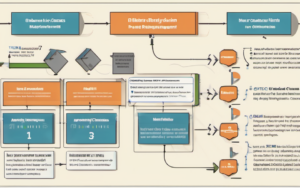The rapid evolution of Blockchain Technology is poised to reshape the landscape of global trade, ushering in a new era of efficiency, transparency, and security. With its decentralized and immutable nature, blockchain has the potential to revolutionize how businesses operate across borders, streamlining processes, reducing costs, and fostering trust.
The Transformative Power of Blockchain in Global Trade
Introduction: A New Era of Efficiency and Transparency
Global trade, while a vital engine of economic growth, often faces challenges related to complex processes, paperwork, and security concerns. Blockchain technology emerges as a powerful solution, offering a decentralized and transparent platform that can address these issues head-on. Its ability to track and record transactions in a secure and tamper-proof manner holds the key to transforming how international trade is conducted.
Understanding Blockchain: A Decentralized Ledger System
Blockchain is a revolutionary technology that operates as a distributed ledger system, where information is stored across multiple computers in a network. Every transaction is recorded in a block, which is then added to a chain of previous blocks, creating a secure and immutable record.
Key Features of Blockchain
- Decentralization: Information is distributed across the network, eliminating reliance on a single authority.
- Immutability: Once a transaction is recorded, it cannot be altered or deleted, ensuring data integrity.
- Transparency: All transactions are visible to all participants on the network, fostering accountability.
- Security: The cryptographic nature of blockchain makes it highly secure and resistant to fraud.
Benefits for Global Trade
Blockchain offers numerous benefits for global trade, including:
- Increased efficiency: Automating processes and reducing paperwork.
- Enhanced security: Reducing fraud, counterfeiting, and other risks.
- Improved transparency: Providing real-time visibility into supply chains and transactions.
- Reduced costs: Streamlining processes and eliminating intermediaries.
Revolutionizing Supply Chain Management
Enhanced Traceability and Transparency
Blockchain enables real-time tracking of goods throughout the supply chain, from origin to destination. This transparency allows businesses to monitor the movement of products, identify potential bottlenecks, and ensure compliance with regulations.
Streamlined Documentation and Data Sharing
Blockchain eliminates the need for paper-based documents and facilitates secure data sharing between all stakeholders. This streamlining reduces errors, delays, and costs associated with traditional trade documentation.
Reduced Fraud and Counterfeiting
The tamper-proof nature of blockchain makes it difficult to alter or manipulate data, reducing the risk of fraud and counterfeiting. This increased security builds trust and confidence in the authenticity of products and services.
Facilitating Secure and Efficient Cross-Border Payments
Faster and Cheaper Transactions
Blockchain-based payment systems enable faster and cheaper cross-border transactions by eliminating intermediaries and reducing processing fees. This efficiency allows businesses to settle payments quickly and cost-effectively.
Reduced Costs and Delays
By streamlining payment processes, blockchain reduces costs associated with bank fees, currency conversion, and delays. This efficiency optimizes cash flow and improves overall profitability.
Improved Security and Trust
Blockchain’s security features enhance the trust and reliability of cross-border payments, reducing the risk of fraud and financial loss. This increased confidence fosters more seamless and secure trade transactions.
Empowering Trade Finance and Insurance
Smart Contracts for Automated Processes
Smart contracts, coded agreements stored on the blockchain, automate trade finance and insurance processes, reducing manual intervention and improving efficiency.
Reduced Risk and Improved Efficiency
Blockchain facilitates secure and transparent trade finance transactions, reducing risk and improving efficiency. This increased trust and visibility encourages more participation in trade finance, expanding access to capital.
Increased Access to Financing
Blockchain can help businesses access financing more easily by providing a secure and transparent record of their transactions, making them more attractive to lenders and investors.
Challenges and Opportunities
Regulatory Landscape and Adoption
The widespread adoption of blockchain in global trade requires clear regulations and a supportive legal framework. Governments and regulatory bodies need to collaborate to create a conducive environment for blockchain-based solutions.
Interoperability and Standardization
Ensuring interoperability between different blockchain platforms is crucial for seamless trade transactions. Standardization efforts are needed to create a unified ecosystem that facilitates data sharing and communication.
Security and Privacy Concerns
Addressing security and privacy concerns is paramount for widespread adoption. Robust security measures and data encryption are essential to safeguard sensitive information and build trust in the technology.
Conclusion: A Future of Seamless and Secure Global Trade
Blockchain Technology holds immense potential to revolutionize global trade, offering a future where transactions are faster, more secure, and more transparent. By addressing challenges and capitalizing on opportunities, businesses can leverage the transformative power of blockchain to enhance their global trade operations. Collaboration and partnerships between stakeholders are essential to drive innovation and unlock the full potential of this groundbreaking technology.




